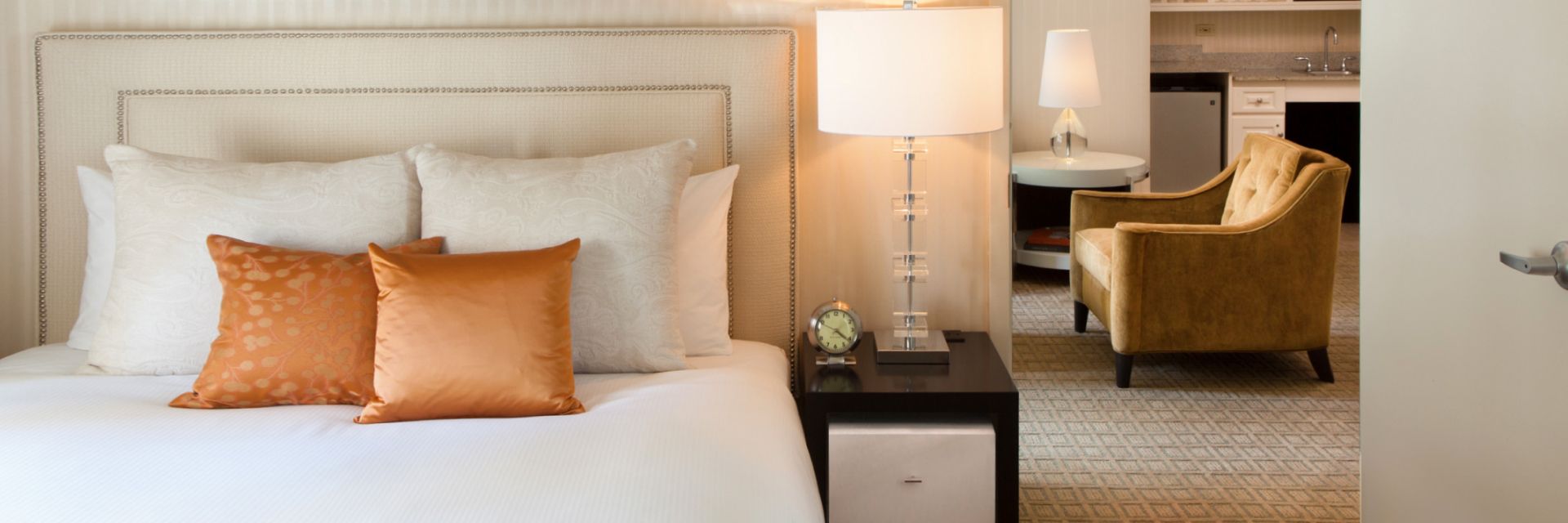How to Get Sleep in a City That Doesn't
The Benjamin Hotel’s mantra is “be at your best.” Increasingly, research shows that not only is sufficient, quality sleep an important factor in better performance and greater success, it may even be the most important factor. With that in mind, in 2013 The Benjamin retained Rebecca Robbins, PhD, a sleep researcher at Cornell University, to help our guests get a great night of sleep and even improve the quality of their sleep at home.
To sleep better, Dr. Robbins suggests that you start with what you can control. Give your bedroom a sleep makeover, and create a wonderful space that soothes your senses. No matter where you live you will benefit from these tips, but for New Yorkers, surrounded by a city constantly in motion, they are even more essential.
Sight
The best bedrooms for sleep are designed to do two things. When the lights are on, they are a peaceful, beautiful environment in which to wind down. When the lights are off, they are a pitch-black sanctuary in which to sleep. Please your eyes by removing the clutter that’s turning your bedroom into an office / TV room / craft corner and keep your bedroom furnishings simple and functional. Neutral colors and blue shades are some of the best bedroom wall color choices.
When the time comes for lights out, make sure you really can’t see a thing. If you go into your room after sundown, you should not see any light at all. This includes the lights from any electronics, or any streetlights you can see through curtains. Consider curtain liners or blackout shades and remove or cover any other sources of light, no matter how small; phone or computer chargers are two small sources of light people don’t think about. In particular, the artificial light of a computer, smart phone or TV screen can actually throw off your natural sleep clock. For the best night’s sleep, power down those devices 30 to 60 minutes before bedtime and completely remove them from your sight.
Sound
For New Yorkers, real quiet can be hard to come by. A set of earplugs works for some. Others prefer the steady hum of a fan or air purifier or white noise to drown out the sounds of their street and night owl neighbors. If you can’t bear to have your phone completely powered down, at least be sure to put it in airplane mode so the ping of incoming emails won’t disturb you.
Touch
Cooler temps – around 65 degrees – promote the best sleep quality. A supportive and comfortable mattress and pillow and luxurious sheets are also worth investing in, as much as your budget allows. Dr. Robbins suggests choosing the lowest entry point of a luxury brand to balance quality and cost. A pillow can make a world of difference in helping you find a comfortable position for sleep in which your head, neck and spine are in alignment.
Smell
Aromatherapy oils can help you relax. Lavender and bergamot are two very soothing choices to experiment with. If you don’t have essential oils, using a lavender-scented fabric softener, showering with a lavender-scented body wash or soap or using a lavender-scented body lotion can be a great part of your before-bed routine.
Once you’ve completed your bedroom makeover, you may notice improved sleep from the first night or gradual improvements over a month or two. Keep an eye on this blog for upcoming posts on sleeping well, including creating a soothing bedtime ritual; picking your ideal pillow; and tips for helping kids sleep well while on vacation.
For even more inspiration for your sleep-friendly space – or to test drive the perfect pillow before you buy – book your stay at The Benjamin. Rebecca Robbins, PhD not only provided guidance for our room decor and design, she also created the Benjamin’s pillow menu. Guests are guided in choosing a quality pillow that suits their natural sleep position.
